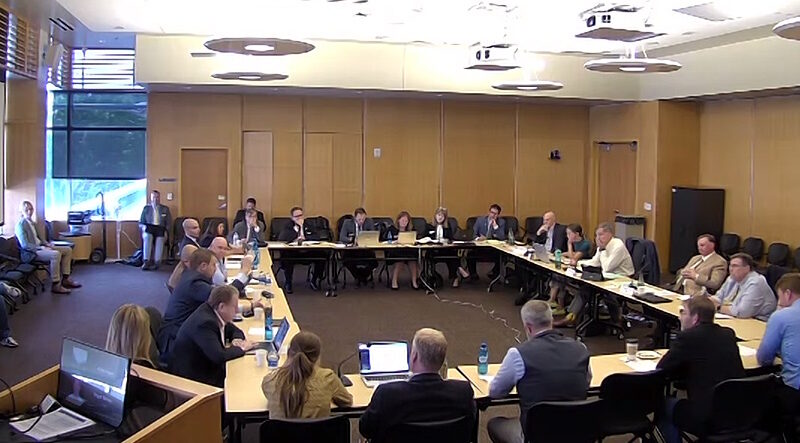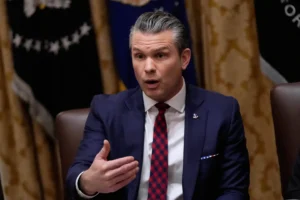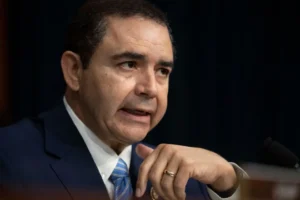State Prepares to Hire Executive Director to Help Launch Wyoming’s New Cryptocurrency
Stable token commission still has many decisions to make and hurdles to clear
- Published In: Politics
- Last Updated: Jul 11, 2023

During a Friday meeting at the University of Wyoming in Laramie, the Wyoming Stable Commission moved forward with plans to hire an executive director, who will be based in Cheyenne or Laramie. (Courtesy photo from the Wyoming Stable Token Commission via Zoom)
By CJ Baker
Special to the Wyoming Truth
As Wyoming leaders begin searching for the right person to help them launch a digital version of the dollar, they’re offering an exciting opportunity, but not a lot of certainty.
For the first executive director of the Stable Token Commission, there are “no guarantees whether this will last two days or two months or two years,” State Auditor and Commissioner Kristi Racines said at a Friday meeting.
Wyoming is breaking new ground in the cryptocurrency space, as no state or country currently offers the kind of digital dollar the commission is working to develop and deploy on blockchains. The seven-member commission — made up of Racines, Gov. Mark Gordon, Treasurer Curt Meier and four subject matter experts — is still working to determine how the token can be used, and the executive director will help shape that vision.

When the state posts the job within the next two weeks, it won’t be the most lucrative position in the crypto industry. Racines said the salary will likely be around $150,000, which she indicated is well below what someone might fetch in the private sector.
“This is going to be a position that someone’s going to really want to do. They’re going to have to want to do it,” Racines said, “because it’s not going to be priced at market.”
The commission is limited by a $500,000 budget to cover a host of tasks, such as developing the technology behind the token, hiring an independent auditor, setting up customer service and potentially adding other staff, such as a compliance officer. Then there’s the sheer challenge of navigating issues like potential constitutional concerns, securities laws, anti-money laundering laws and ensuring the tokens stay out of the hands of sanctioned individuals and countries.
While there’s much discussion about the token being used by retailers to facilitate cheaper and faster payments, commissioners indicated that may have to wait until later phases of the project. Commissioner Joel Revill, the CEO of a Jackson-based wealth management firm, suggested the state initially target institutions that are looking to engage with cryptocurrencies and blockchain technology. Revill said the existing stablecoins that represent the U.S. dollar have failed to win the confidence of institutional investors.
For the State of Wyoming, “there is an opportunity to create a vehicle which is domestic, more transparent, more clearly audited, … [more] clarity around the reserves and what the reserves are invested in, and has more clarity vis-à-vis federal oversight,” Revill said.
Fighting the Fed
However, getting federal regulators on board may be one of the biggest challenges, particularly in the midst of a crypto crackdown led by Securities and Exchange Commission Chair Gary Gensler. Gordon said the state will need to carefully evaluate each potential use case for the token, “so we don’t blindly stumble into Mr. Gensler in a dark room.”

Joel Telpner, the chief legal officer at Input Output Global, suggested conflict with the federal government may be inevitable; Input Output recently found itself at odds with the SEC, as the agency asserted that a cryptocurrency developed by the company, called ADA, is an unregistered security.
“I think it is likely that there will be a number of battles ahead with various federal regulators,” Telpner advised the commission. “But of all the states in this country, I think this is the one that’s best equipped to handle those fights.”
The Wyoming Attorney General’s Office is already engaged in litigation with the Federal Reserve, after the Fed took a dim view of the state’s crypto-friendly banking laws. However, Commissioner Flavia Naves, who served as the chief legal officer for the issuer of the world’s second-largest stablecoin, said the state will likely need independent counsel, too.
“Wyoming is the first one to do this. And with it comes a privilege, and it becomes a burden, right?” Naves said. “You’re the first state to try to do something like this, which is amazing. And you’re the first state to do something like this, and everyone’s going to ask questions.”
The Legislature said the commission must “endeavor” to issue its first token by the end of the year, and the state wants to be the first to launch such an effort. However, commissioners indicated the priority is to do things right rather than fast.
“With the experts that we have here, I think they’re going to keep us out of trouble,” said Curt Meier. “But I think we have to move judiciously.”
Beyond limiting the initial launch of the token to institutional investors, there was some discussion about potentially keeping the trial run in-state, to avoid federal restrictions. While no specifics were settled, Commissioner and CPA David Pope endorsed the idea of a phased approach.
“We go after what would be the most secure and most lucrative first, if we can do that, and then move to broad acceptance, maybe,” Pope said.
More than making money

The stable token effort has its critics. Gordon said there “are several vultures waiting for failure of this,” and the state’s banking industry has questioned the point. On Friday, Wyoming Bankers Association President Scott Meier reiterated his call for the commission to develop a business plan, noting the $500,000 of tax dollars invested in the project.
“We’ve heard numbers about billions [of dollars in potential revenue] or millions or what have you,” he said. “I don’t know how this is all going to work, but I’d like to see a business plan that shows this is the kind of investment that this Legislature is going to make, this is the kind of return they expect.”
Customers will purchase each $1 token with $1 in cash, and while the tokens are being used on a blockchain, the state will invest the cash in short-term treasury bills. With those bills currently offering a more than 4% return, Revill said grabbing just 1% of the current $128 billion stablecoin market could net the state $50 million a year.
But Sen. Chris Rothfuss (D-Laramie) said making money isn’t the only goal. One driving aim, he said, is to create a cryptocurrency that is trustworthy enough for the state to accept. The token could enable residents and businesses to pay their sales and use taxes with a digital currency that settles instantly, has lower fees and a more rigorous process than current options, Rothfuss said.
“The fact that it also offers potential for an incredible return on investment, particularly with current interest rates, is an incredible feature. That was a good selling point, getting it through the Legislature,” he said. “But at the end of the day, without something like this in place, without a stable token in place, governments can’t take digital assets, can’t engage in cryptocurrency transactions. And that is a major policy interest.”
Gordon said the commission’s Aug. 10 meeting should focus on use cases for the token, including potential revenues and challenges.













